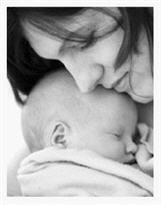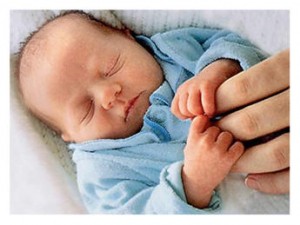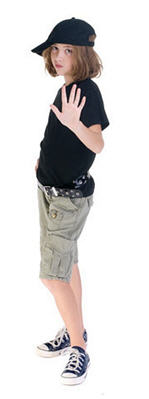Women and their clocks. If only there were a way to stop that damnable ticking. Who says a woman is defined by biology, anyway? The Pill took us part way there, so why not a means to extend the period of time we might bear children?
 Maybe by a decade. Possibly longer. How’s that for a bright feminine and feminist future?
Maybe by a decade. Possibly longer. How’s that for a bright feminine and feminist future?
Well that (so-called) fantasy isn’t a pipe dream. At least, if you have the money, the determination, and access to the requisite medical technology according to a recent article appearing in the May issue of Vogue: Time to Chill? Egg Freezing Technology Offers a Chance to Extend Fertility.
It’s a fascinating read, and I recommend it – an examination of the procedures, probabilities of success, potential pitfalls, monetary investment, and reasons that women are opting for this sort of biological backup plan. It’s also no surprise that it’s big business. And growing.
As time marches on, so do the advances in reproductive technologies. But what if it isn’t quite so simple as conception at 45 or 48 or 50 – or older?
Make Money Now, Marry Later, Kids Later
We don’t always meet someone to partner with when we’re young, or at the ideal age to become a parent – whatever we might think that is. And even if we do marry, it may not last. Or, conception may not come easily.
Thankfully, millions of women have been helped through (now) traditional fertility treatments. Among them is IVF (In Vitro Fertilization), which takes money, time, and a kind of courage and persistence that I can only imagine. My hat is off to those women who go through it, and the men who stand by them.
As for harvesting eggs and freezing them (preferably the younger the better, according to experts), it is – among other things – expensive. It may cost $15,000 for each round of the process of extracting viable eggs – and of course – there are annual storage costs for your baby-futures, as they must be carefully housed indefinitely in a cryogenic vat.
While the process has been deemed experimental (since 2006), officials of the ASRM (American Society for Reproductive Medicine) are not discouraging women from using it. However, according to Dr. Samantha Pfeifer, a reproductive endocrinologist (head of the ASRM’s committee on reproductive-medicine guidelines):
“It may be an amazing chance for women to have control over their reproductive future. We just don’t think there are yet sufficient studies.”
The article continues:
Pfeifer worries that some doctors may be giving patients a false sense of security. Even for a woman in her mid-30s, it takes about 20 frozen eggs to be reasonably sure of a single pregnancy – women of all ages produce many eggs that are unusable, and the percentage climbs as we grow older… At 50 percent success rates per cycle, half the women who believe their frozen eggs will ensure a baby will be disappointed each time they try.
But here’s my concern, which is only mentioned briefly: How old is too old to become a mother?
And taking it a step further: Just because you can give birth to a baby at 60, should you? Or for that matter, at 50? What about everything that follows conception, birth, and infancy? What about actually raising your children?
It may be worth noting that a 2010 Forbes Woman article on freezing eggs more closely ties the deferred parenting choice to leveling the career playing field.
Parenting Realities
Whatever the real or perceived reasons for delaying pregnancy, I cannot imagine the heartbreak of infertility; I haven’t lived it. But I have experienced a decade of being a largely solo mother, and an “older” one at that.
And I gave birth in my mid-late 30s, not my late 40s or 50s.
I’m thrilled for those women who have additional options when it comes to getting pregnant, whether it’s more traditional methods, or egg harvesting and storage which is, incidentally, expected to eclipse the already multi-billion dollar IVF business.
 But what about the children? Assuming these babies would ultimately be born healthy (no evidence to the contrary at this time), what about their lives with older mothers?
But what about the children? Assuming these babies would ultimately be born healthy (no evidence to the contrary at this time), what about their lives with older mothers?
Who is talking about the reality of parenthood in middle-age, or parenthood when you are – dare I say it – old?
I’ve stated this before and I will again: being a mother has been the hardest and most rewarding work of my life. I wouldn’t have missed it for anything. But I believe that women in their 60s bearing children makes no sense. I’ll go on to say it’s selfish and unreasonable. I would characterize women becoming mothers in their 50s as equally foolish, with the caveat that there are always exceptions.
I do believe in fertility treatments, in advances in reproductive technologies, and in responsibly focusing on the quality of life that the child would lead being born of older parents who are truly too old.
Would I take it upon myself to say how old is too old? That’s not a role I seek. But even if you have money now, what if circumstances change, including your health, marital status, and finances? And if you’re determined to become a parent, what about all the children without homes?
Real-World Parenting Profession
Setting aside money for the moment, what worries me is the fantasy aspect, potential exploitation of a woman’s desperation, and the emphasis on conception rather than parenting. However Orwellian and intriguing, isn’t it off the mark? And I repeat – just because you can, should you?
But babies are the easy part. What about everything after giving birth – the heart and hard work of the parenting profession?
Children are not a female entitlement; they are a privilege and a responsibility. They need to be taught, encouraged, tolerated, disciplined; compassion should be modeled, reasoning exemplified, character developed. They need to be listened to, spoken to, challenged, reined in, cuddled, cared for when they’re sick or scared, cheered on, worried over.
 Then there’s homework, picking your battles, managing bullies, getting through the first crush, dealing with disappointments, burgeoning sexuality, spirituality if that’s part of your plan. There’s explaining about cigarettes and drugs, alcohol and sex, strangers and the Internet, and hoping that some of it will stick through sheer repetition and consistency and that somehow, whatever they go through as puberty crazies them and adolescence reshapes them – the children you love so profoundly – will come out the other side, intact.
Then there’s homework, picking your battles, managing bullies, getting through the first crush, dealing with disappointments, burgeoning sexuality, spirituality if that’s part of your plan. There’s explaining about cigarettes and drugs, alcohol and sex, strangers and the Internet, and hoping that some of it will stick through sheer repetition and consistency and that somehow, whatever they go through as puberty crazies them and adolescence reshapes them – the children you love so profoundly – will come out the other side, intact.
And by now you’re 60 or 65 or maybe even pushing 70 if you buy into this notion that the biological clock can be set aside, and that your right to give birth trumps a child’s right to a chance at family. Or at the very least, one parent who has a shot in hell of being there. Really being there.
For the six thousand five hundred days – and more – that it takes to do the job.
© D A Wolf
Nice post. You’re right. Pregnancy and childbirth are the easy parts. I had my girls when I was in my 20’s. I can’t even begin to imagine dealing with babies and toddlers now, in my 40’s. I was once a mother-to-mother breastfeeding counselor with a well-known international organization. The older mothers I helped seemed to have a harder time dealing with adapting to the needs of their babies, dealing with night-waking, etc.
My master’s thesis was titled: Population, Environmental Degradation and the Masculinist Worldview. One of the dichotomies I explored was the use of new reproductive technologies in the first world and the first world’s emphasis on new contraceptive technologies for poorer women in the third world, as well as in the United States.
You raise interesting points, Andrea. And this is a sweeping set of related topics, including – as you say – contraception.
It’s funny, but there was a time when having babies in your late 30s was considered incredibly old! I recall a close friend in high school who had parents who were then in their 50s – a full 10 years older than the other parents, and my friend was always embarrassed by their appearance and their behaviors. Today – that would be no big deal.
I truly believe that some of these advances are wonderful. But as with most things, it’s human nature to believe what we want (rather than what’s in front of us), and imagining that we can dispense with some biological basics concerns me. And we tinker, and tinker, and tinker with our bodies. Generally the female bodies. And I do know wonderful mothers (and kids) who are doing a fine job of parenting “older,” dealing with teens when they themselves are in their 50s and early 60s. To some degree, there is a wisdom/maturity trade-off – and perhaps that’s part of the benefit when looking at beginning families a bit older.
But babies at 50? That means carpool at 60, teens at 65… Really? I mean… really???
Being a “woman of a certain age” now, I believe childbearing is best left to those with the energy and stamina to chase a three year old around the house while making lunch, talking on the phone, cleaning the kitchen and feeding the dog. Being in fairly decent shape, I still cannot fathom full-time mommyhood of young children past the age of 40. Plus, I believe there is something to be said of a mom who is not two generations removed from the culture of her children. Having “been there, done that,” a mom that can relate in some way to what their teen is going through is in a position to offer much more relevant advice. Plus, the older we get, the more set in our ways we become. Not a good combination in raising children and teens, where flexibility is the key to sanity.
I’m really on the fence on the trend to push off motherhood into middle age. There are plenty of sandwich generation parents taking care of both their children and aging parents. With the push to begin a family later and later, the burden of taking care of aging parents will fall to younger children, maybe not necessarily equipped financially or emotionally to deal with this issue.
Such important points, Lisa. Our ability to be flexible with the perspective of our kids (by not being two generations removed), and the Sandwich effects of caring for kids and aging parents.
I hadn’t thought of this issue – the 25-year old barely beginning his or her life, carrying the emotional, logistical, and financial burden of a 70 or 75-year old parent.
When there’s money of course, the picture changes somewhat.
You’ve just given new life to the term octomom … Now it’s for those women who decide to become moms when they should normally be grandmothers! And what about the women who try and try for so very long to have children? They exhaust their resources and options, and when/if it happens, they’re of “advanced maternal age” and face all the risks and complications that come along with that. It’s a double-edged sword (speculum?), no doubt.
I have seen women on the news having babies at age 60 (http://www.cbc.ca/news/canada/calgary/story/2009/02/04/cgy-twins-60yearold-mother.html)! It just doesn’t seem like a good idea to me. Those children will never know grandparents. They will see their parents decline and die early in life. It just doesn’t seem just or logical.
My mom had two kids in her 30s and two in her 40s. She always felt awkward at back to school night for her youngest child. She had things in common with parents of my friends, but the huge age gap with parents of my youngest sibling did not lend itself to friendships.
If you are having a child and a grandchild at the same time like Michelle Duggar, you’re probably too old. But at least she is still having children naturally.
The cutoff age in Canada for IVF is between 45 and 50 years old. That seems about right to me.
My wife and I went through ten years of infertility before adopting; now we’re elder parents. If you’d like to know how it’s working, check out my blog.
I suspect it’s working very well, Wolf. From reading your chronicle of mindful fatherhood, as you call it. I can’t imagine what those ten years must have been like for you both. And I can imagine that Nick is very fortunate to have you.
Wolf. Wolf, Wolf, Wolf. I would like to quote two things.
“But I believe that women in their 60s bearing children makes no sense. I’ll go on to say it’s selfish and unreasonable. I would characterize women becoming mothers in their 50s as equally foolish, with the caveat that there are always exceptions.”
I often have this discussion with Ben because we had the chance to get married young and have children young–a position we exploited (for good). I do know that my good fortune is that–a good fortune. But, if I were to not wed until 50, would I risk bringing a child into this world when my body is beginning it’s slow decline back to the earth (to put it in a biological sense) (and I mean that to be unoffensive)? Children of all ages require a great deal of energy from their parents and, hey, the older you get the less energy you can expend. That’s physics. So, is it fair to capitalize on my reproductive ability? Which brings me to the second quote.
“Children are not a female entitlement; they are a privilege and a responsibility.”
I have often told Ben that I don’t deserve a healthy baby any more than the next mother; but, I do know I provide a safe, loving, and learning-rich environment for every child that blesses our home. At the same time, I know many friends who want a big family just to have a big family. And they struggle greatly with the little aspects of parenting. Would I tell them to stop and think? No, that’s their decision. I do wish, though, that they understood this principle that you stated. That we all understood it (myself included) better.
I’m not altogether sure if you’re agreeing, disagreeing, or expanding on what I wrote. (Any of the above is fine; I’m just not clear.)
Obviously, I’m expressing my opinions, based on an article that I read. In attempting to position the medical technology (and reasons single women were availing themselves of it), the information was focused on the conception process, not to mention the realities of contemporary life which may result in more women who don’t fall into the traditional married-with-children mode while still in their prime child-bearing years.
What I am concerned about is the extent to which relatively few people discuss the hard, hard realities of what comes after – actually raising kids. And not just little kids, growing kids.
As for the “slow decline back into the earth at 50,” I know some women who would disagree with you. (And others, who might not!) If anything, I am for medical advancements to assist with fertility issues, but I can’t help but think that there is a profit motive to that age envelope that is being pushed (and that age cutoff, as I said, isn’t a call that I would make). All I know is that parenting older is hard, hard, hard. Parenting is hard, period.
With two parents, extended family, in good health, and money? Age becomes far less of an issue. Plenty of love and patience and teaching to give? Great. Good for kids of any age. But I worry about the kids, and the parents. I don’t have answers. I do have concerns.
Ha! I was agreeing with you, and expanding a little bit. And the phrase about the “slow decline back to the earth” was sarcastic (and slightly realistic, in the sense that after 50, or starting with 60, our bodies begin to show signs of aging–a scientific truth that some people wish to cover up, unfortunately [because I think aging is a beautiful thing]).
Yes. I don’t have answers either, just opinions. : )
Trust me, Amber. Our bodies shows signs of aging long before 50! 🙂
Back in the early 60’s my mother gave birth to me, at the ripe age of 33. By the time I hit my teens, she was done parenting. I had my children in my early 30’s and I know in my later 40’s (cough cough) I’m tired! 🙂